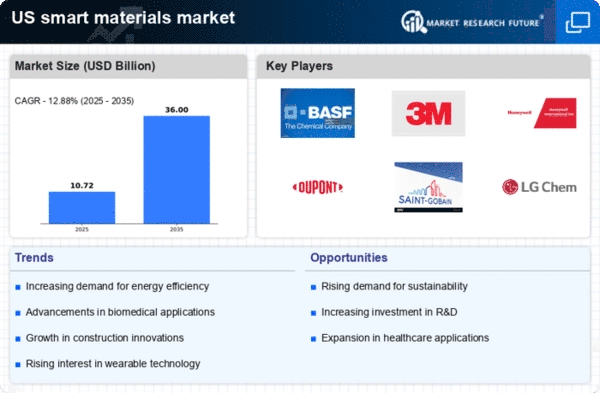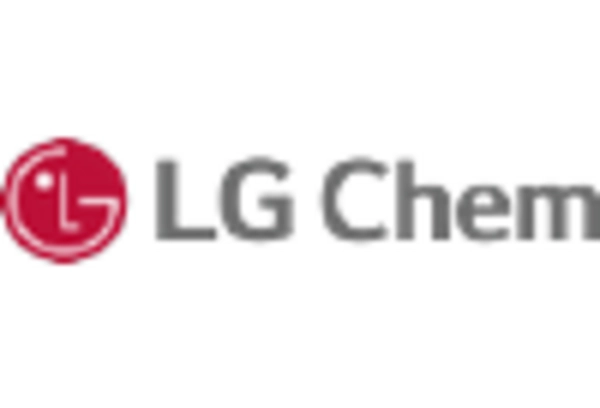The smart materials market is currently characterized by a dynamic competitive landscape, driven by innovation, sustainability, and technological advancements. Key players such as 3M Company (US), DuPont de Nemours Inc. (US), and BASF SE (DE) are at the forefront, each adopting distinct strategies to enhance their market positioning. 3M Company (US) emphasizes innovation through its extensive R&D investments, focusing on developing advanced materials that cater to diverse applications, including healthcare and electronics. Meanwhile, DuPont de Nemours Inc. (US) is strategically expanding its portfolio through acquisitions, aiming to integrate smart materials into its existing product lines, thereby enhancing its competitive edge. BASF SE (DE) is also pursuing a strategy of regional expansion, particularly in North America, to capitalize on the growing demand for smart materials in various industries, including automotive and construction.The business tactics employed by these companies reflect a concerted effort to optimize supply chains and localize manufacturing processes. The market structure appears moderately fragmented, with several players vying for market share, yet the influence of major companies remains substantial. This competitive environment fosters innovation and drives advancements in smart materials, as companies seek to differentiate themselves through unique offerings and enhanced performance.
In October 3M Company (US) announced a partnership with a leading technology firm to develop next-generation smart textiles that respond to environmental stimuli. This collaboration is poised to enhance 3M's capabilities in the wearable technology sector, aligning with the growing trend towards smart, responsive materials. The strategic importance of this partnership lies in its potential to position 3M as a leader in the smart textiles market, catering to the increasing consumer demand for innovative and functional clothing.
In September DuPont de Nemours Inc. (US) completed the acquisition of a specialty materials company, which specializes in advanced polymers used in smart applications. This acquisition is likely to bolster DuPont's product offerings and enhance its technological capabilities, allowing it to better serve industries such as aerospace and automotive. The strategic move underscores DuPont's commitment to expanding its footprint in the smart materials sector and leveraging synergies from the acquired company to drive innovation.
In August BASF SE (DE) launched a new line of smart coatings designed to improve energy efficiency in buildings. This initiative not only reflects BASF's focus on sustainability but also positions the company to meet the increasing regulatory demands for energy-efficient solutions. The launch is significant as it aligns with global trends towards sustainable construction practices, potentially enhancing BASF's market share in the building materials segment.
As of November the competitive trends in the smart materials market are increasingly defined by digitalization, sustainability, and the integration of artificial intelligence. Strategic alliances are becoming more prevalent, as companies recognize the value of collaboration in driving innovation and enhancing product offerings. Looking ahead, competitive differentiation is likely to evolve, shifting from traditional price-based competition to a focus on technological advancements, innovation, and supply chain reliability. This transition suggests that companies that prioritize R&D and sustainable practices will be better positioned to thrive in the evolving market landscape.

















